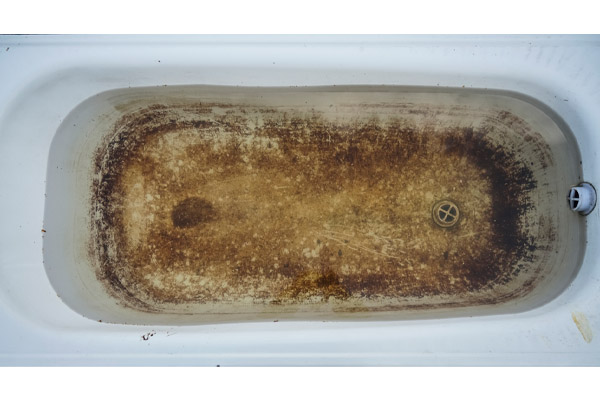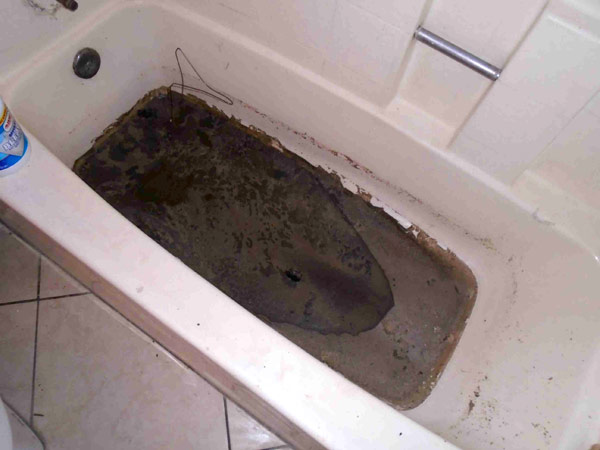Have you been looking for advise about Water Coming up Bathtub Drain?

Sewer back-up in the tub can be an upsetting and unhygienic issue for any type of property owner. Not just is it inconvenient, however it likewise positions serious health and wellness dangers and indicates underlying concerns with the plumbing system. Recognizing why sewage is coming up with the bathtub is critical for taking proper action to deal with the issue successfully.
Introduction to the Issue
Recognizing the Issue
When sewage draws back up right into the bathtub, it's a clear sign of a trouble with the drain system. The wastewater that ought to be streaming far from your home is rather locating its way back right into your space, which can result in considerable damages and health hazards.
Potential Causes
Numerous elements can add to sewage backup in the bath tub. From obstructions in the sewer line to problems with the plumbing infrastructure, identifying the root cause is crucial for finding a solution.
Typical Reasons for Sewage Back-up
Blockages in the Drain Line
One of one of the most common sources of sewage backup is a clog in the drain line. This can take place due to the build-up of particles, oil, or foreign things in the pipes, stopping proper flow and triggering sewage to back up into your tub.
Tree Root Invasion
Tree origins seeking wetness and nutrients can penetrate sewage system lines via small fractures or joints. Gradually, these roots can expand and increase, causing substantial damage to the pipelines and causing sewer backup concerns.
Aging Facilities
Older homes may have outdated plumbing systems that are much more at risk to rust, cracks, and degeneration. As pipelines age, they end up being extra susceptible to leakages and blockages, boosting the probability of sewage backup occurrences.
Heavy Rainfall or Flooding
During durations of heavy rainfall or flooding, the sewer system might become overloaded with excess water, triggering backups and overflows. This can lead to sewer supporting right into bath tubs and other components inside the home.
Wellness Dangers Associated with Sewage Back-up
Contamination of Water Supply
Sewer backup can infect the water in your house, posturing a significant wellness risk to you and your family members. Exposure to contaminated water can bring about stomach issues, skin infections, and other health problems.
Spread of Disease
Sewer contains unsafe bacteria, infections, and parasites that can create a variety of conditions, consisting of liver disease, cholera, and gastroenteritis. Entering into contact with sewer or polluted surfaces puts you at risk of infection.
Mold Growth
Wetness from sewage back-up can develop perfect conditions for mold growth in your home. Mold spores can intensify respiratory system issues and create allergies in delicate individuals, making prompt clean-up crucial.
Signs of Sewage Backup
Foul Odors
Unpleasant odors originating from drains pipes or components, particularly in the bathroom, might suggest sewage back-up concerns. These smells are frequently strong and relentless, indicating an issue that calls for instant attention.
Slow Draining Fixtures
Bathtubs, sinks, and toilets that drain pipes slowly or not whatsoever could be experiencing sewer backup. If numerous fixtures are impacted all at once, it's most likely that the concern stems from an usual point, such as the major sewage system line.
Gurgling Noises
Unusual gurgling or bubbling noises originating from drains pipes when water is running elsewhere in the house are indicative of air caught in the plumbing system. This air buildup can arise from sewer backup and must be checked out quickly.
Immediate Actions to Take
Switching Off Supply Of Water
In the event of sewer backup, it's necessary to shut off the water to avoid further contamination and damages. Locate the main water shutoff valve in your house and closed it off up until the issue can be resolved.
Getting In Touch With a Specialist Plumber
Handling sewer backup is not a do it yourself job. Call a licensed plumber with experience in dealing with sewage-related concerns to assess the situation and carry out needed repairs or cleanings.
Staying Clear Of Contact with Polluted Water
Till the sewage back-up is settled, prevent contact with infected water to avoid the spread of microorganisms and microorganisms. Use protective equipment if you need to remain in the afflicted area and wash your hands extensively later.
Safety nets
Regular Upkeep of Drain Lines
Set up normal inspections and maintenance of your drain lines to recognize and deal with prospective issues prior to they intensify into major troubles. This can include clearing out particles, examining for tree origin breach, and fixing any damaged pipes.
Installing Backwater Shutoffs
Consider setting up backwater shutoffs in your plumbing system to avoid sewer from receding right into your home throughout durations of heavy rainfall or flooding. These shutoffs instantly close when water draws back up, protecting your residential or commercial property from contamination.
Correct Disposal of Home Waste
Avoid flushing anything apart from toilet paper and human waste down the bathroom to prevent clogs and blockages in the sewer line. Dispose of grease, oil, and other family chemicals effectively to reduce the risk of plumbing issues.
Tidying up After Sewage Back-up
Disinfection Procedures
Extensively sanitize and sanitize influenced areas after sewage back-up to get rid of harmful bacteria and stop mold development. Usage ideal cleaning products and protective equipment to guarantee secure and efficient cleanup.
Reconstruction of Impacted Areas
Repair any damage to flooring, walls, or components brought on by sewer backup. Depending on the extent of the damages, you might require to change carpets, drywall, or other materials to restore your home to its pre-loss problem.
Why is there sewage coming up from my bathtub?
These gas fumes, like hydrogen sulfide – the gas that leaves a rotten egg smell in its wake and is highly flammable and toxic – can be hazardous to your health. Sewage poses major health risks as it contains harmful bacteria and microorganisms that can be dangerous if exposed to them.
Sewage cleanup should be considered an emergency.
So, why is there sewage coming up from your bathroom? There are several common causes of a sewage backup.
The most common reason for sewage coming up through your bathroom is a clogged sewer line. All plumbing in your bathroom connects to a single drain pipe that leads to the sewer line under your house. This drain line carries all wastewater and sewage away from your home to the city’s sewer system.
When the sewer line becomes clogged or blocked, wastewater has nowhere to go but back toward your house. This results in sewage coming up through your drains, often starting with your tub or shower.
Another culprit may be the sewage ejector pump, which is used when a bathroom, laundry room or any other type of plumbing fixture is located below the level of the main sewer or septic line flowing from the house. Most commonly, ejector pumps are used in homes with basement bathrooms or laundry rooms.
When you experience sewage coming up through your bathtub, it’s always best to contact a professional. Attempts to fix a clogged sewer line without experience often lead to more plumbing damage.
Make sure that no one enters the affected area, and open as many windows as possible. Pre-treat the flooded area with small splashes of chlorine bleach. Wear protection gear like rubber gloves, a mask, and water-resistant coveralls.
https://www.shawlocal.com/the-herald-news/sponsored/2022/08/17/omega-plumbing-10199038/

We had been made aware of that article on from a friend on another web blog. Do you know somebody else who is interested in the niche? Do not hesitate to share it. I cherish your readership.
Call Today